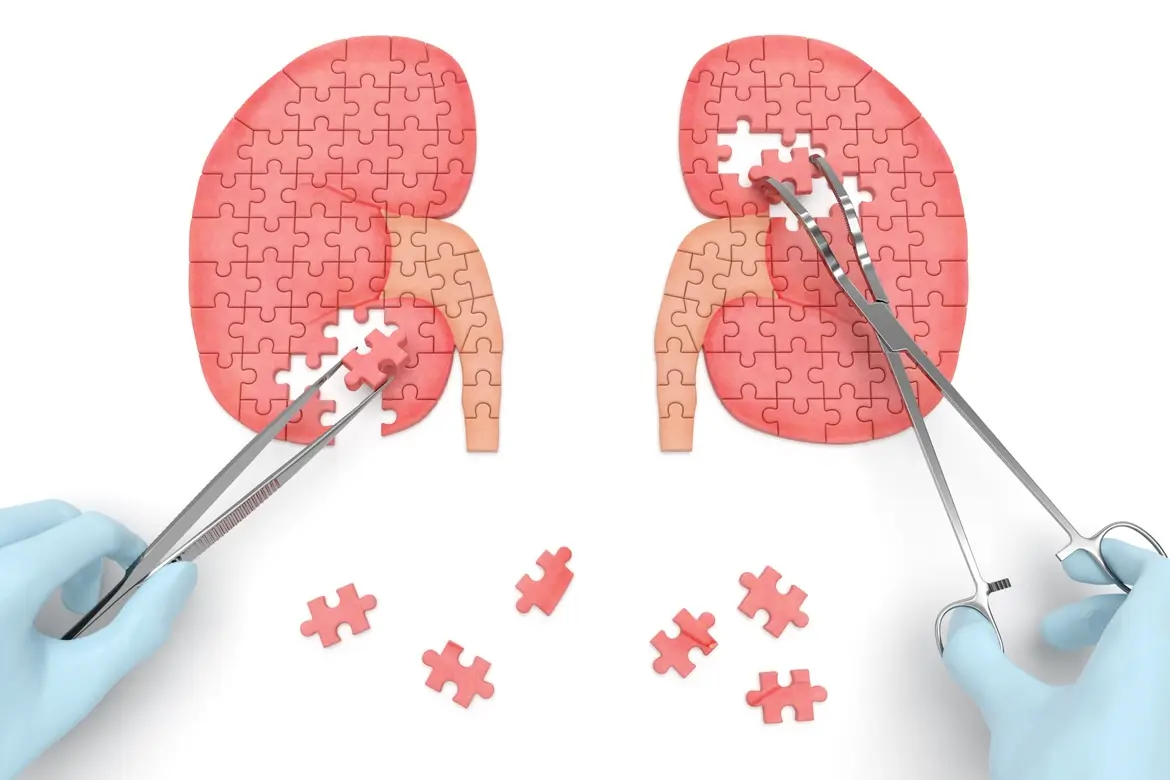The kidneys are vital organs that play a crucial role in the overall health of our bodies. They are responsible for filtering waste, balancing electrolytes, and regulating blood pressure. With modern lifestyles putting increasing strain on our bodies, kidney health is more important than ever.
What is the main function of the kidney?
The kidneys are primarily responsible for filtering and removing waste products and excess water from the blood, producing urine as a result. They regulate the body’s fluid and electrolyte balance, help control blood pressure, and are crucial in the production of red blood cells. Maintaining the health of your kidneys is essential for ensuring that these complex processes function smoothly.
How can you improve kidney function naturally?
Improving kidney function naturally involves a combination of diet, exercise, and lifestyle adjustments:
- Stay hydrated: Adequate hydration helps the kidneys clear sodium and toxins from the body. Aim for 1.5 – 2 litres of water per day, although individual needs can vary.
- Maintain a balanced diet: A diet rich in fruits, vegetables, whole grains, and lean proteins can help reduce the strain on your kidneys.
- Control salt intake: High sodium levels can increase blood pressure, harming your kidneys. Limit your salt intake to no more than 5 grams per day.
- Monitor protein consumption: While protein is essential for health, excessive amounts can burden the kidneys. Opt for plant-based proteins and lean meats in moderation.
- Regular exercise: Regular physical activity can help maintain healthy blood pressure and improve overall kidney function.
Foods to avoid for early-stage kidney disease
For individuals diagnosed with early-stage kidney disease, it is crucial to avoid certain foods to manage the condition and slow its progression. These foods include:
- High-sodium foods: Salt and high-sodium seasonings can raise blood pressure and cause fluid retention, causing the kidneys to have to work harder.
- High-potassium foods: Foods such as bananas, oranges, potatoes, and tomatoes should be limited as impaired kidneys may not be able to remove excess potassium efficiently.
- Dairy products: Limit intake as they contain high levels of phosphorus which can be harmful in kidney disease; alternatives include almond or rice milk.
- Processed meats: These are usually high in sodium and phosphorus, both of which should be limited to protect kidney function.
- Nuts and seeds: While healthy for most, they contain high levels of potassium and phosphorus, which can be problematic for kidney health.
It's important for individuals with early-stage kidney disease to work closely with a healthcare provider or dietitian to tailor their diet according to their specific health needs and kidney function.
How can you improve kidney function to avoid kidney damage and dialysis?
Poor kidney function, if not addressed, can progress into chronic kidney disease (CKD), which can then lead to end-stage kidney disease (ESKD), otherwise known as kidney failure.
This may ultimately result in the patient requiring dialysis when the kidneys are no longer able to perform their necessary functions adequately. Dialysis performs some of the functions of the kidneys: cleaning the blood and balancing body fluids.
To improve kidney function and potentially avoid dialysis in the long term, speak to your healthcare provider on how you can focus on managing underlying conditions that can cause kidney damage, such as diabetes and high blood pressure.
Regular monitoring of these conditions, combined with the lifestyle changes mentioned above, can significantly delay the progression of kidney disease.
What tests are done to check kidney function?
Tests to check kidney function include:
- Blood tests: These assess levels of creatinine and urea to gauge how well kidneys are filtering waste.
- Urine tests: These check for protein or blood in the urine, which can indicate kidney damage.
- Imaging tests: Ultrasound or CT scans can check the size and structure of the kidneys.
How can you prevent kidney failure?
Preventing kidney failure involves several proactive strategies:
- Regular screening for kidney function: Especially important if you have risk factors such as diabetes, hypertension, or a family history of kidney disease.
- Avoiding certain painkillers: Nonsteroidal anti-inflammatory drugs like ibuprofen can cause kidney damage if taken regularly.
- No smoking: Smoking can impair kidney function and worsen existing kidney diseases.
- Limiting alcohol: Excessive alcohol can harm the kidneys and other organs.
How long can you live with failing kidneys?
The prognosis for someone with failing kidneys varies widely and depends on the extent of kidney damage and how well the individual manages their condition. Early diagnosis and proactive management can prolong both life expectancy and quality of life. With appropriate treatment, many people with chronic kidney disease can live long and active lives.
When should I see a doctor for my kidney health?
Seeking timely medical advice for kidney health is crucial in preventing and managing kidney disease. It is important to consult a doctor if you notice signs that could indicate kidney problems or if you are at increased risk of kidney disease.
You should see a doctor if you experience:
- Swelling in legs and ankles: This can be a sign of fluid retention caused by the kidneys' failure to eliminate excess fluid from the body.
- Persistent fatigue: Kidney issues can lead to a build-up of toxins and impurities in the blood, which can cause increasing lethargy.
- Difficulty concentrating: An accumulation of toxins may also affect brain function, leading to memory problems or trouble concentrating.
- Changes in urine output: This could include urinating more or less than usual, foamy urine (which can indicate protein in the urine), or urine that is dark or bloody.
- Nausea and vomiting: These symptoms can occur as toxins build up in your blood.
- Breathlessness: Anaemia or fluid build-up in the lungs due to poor kidney function can cause difficulty breathing.
- Unexplained itchiness: High levels of waste in the blood can lead to severe itching.
Certain individuals are also at higher risk for kidney disease and should have regular check-ups:
- Individuals with diabetes or high blood pressure: These conditions are the leading causes of kidney disease.
- Family history of kidney disease: Genetic factors can play a significant role in kidney health.
- Older adults: Kidney function naturally declines with age.
- People with established cardiovascular disease: Conditions like heart failure and atherosclerosis are linked with kidney disease.
- Individuals taking long-term medications: Some medications can affect kidney health, such as certain blood pressure medications, antibiotics, and pain relievers.
Importance of professional medical advice
While lifestyle changes such as diet, exercise, and fluid intake are vital in maintaining kidney health, they should always be paired with regular medical consultations. Medical professionals can provide:
- Personalised medical advice: Tailored recommendations based on individual health status and kidney function.
- Monitoring and tests: Regular monitoring through blood and urine tests to track the health of your kidneys and adjust treatments as necessary.
- Early intervention: Prompt treatment and management of symptoms or complications associated with kidney disease.
It's essential to remember that early intervention can prevent or delay the progression of kidney disease, enhancing the quality of life. If you exhibit any symptoms or belong to a high-risk group, consult a healthcare provider to discuss your kidney health.















